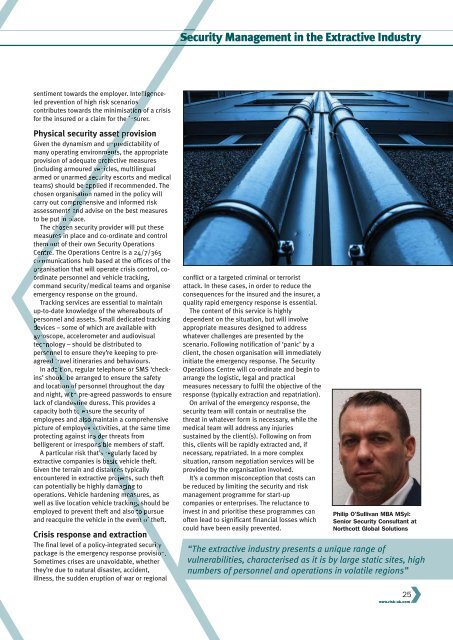RiskUKNovember2017
Create successful ePaper yourself
Turn your PDF publications into a flip-book with our unique Google optimized e-Paper software.
Security Management in the Extractive Industry<br />
sentiment towards the employer. Intelligenceled<br />
prevention of high risk scenarios<br />
contributes towards the minimisation of a crisis<br />
for the insured or a claim for the insurer.<br />
Physical security asset provision<br />
Given the dynamism and unpredictability of<br />
many operating environments, the appropriate<br />
provision of adequate protective measures<br />
(including armoured vehicles, multilingual<br />
armed or unarmed security escorts and medical<br />
teams) should be applied if recommended. The<br />
chosen organisation named in the policy will<br />
carry out comprehensive and informed risk<br />
assessments and advise on the best measures<br />
to be put in place.<br />
The chosen security provider will put these<br />
measures in place and co-ordinate and control<br />
them out of their own Security Operations<br />
Centre. The Operations Centre is a 24/7/365<br />
communications hub based at the offices of the<br />
organisation that will operate crisis control, coordinate<br />
personnel and vehicle tracking,<br />
command security/medical teams and organise<br />
emergency response on the ground.<br />
Tracking services are essential to maintain<br />
up-to-date knowledge of the whereabouts of<br />
personnel and assets. Small dedicated tracking<br />
devices – some of which are available with<br />
gyroscope, accelerometer and audiovisual<br />
technology – should be distributed to<br />
personnel to ensure they’re keeping to preagreed<br />
travel itineraries and behaviours.<br />
In addition, regular telephone or SMS ‘checkins’<br />
should be arranged to ensure the safety<br />
and location of personnel throughout the day<br />
and night, with pre-agreed passwords to ensure<br />
lack of clandestine duress. This provides a<br />
capacity both to ensure the security of<br />
employees and also maintain a comprehensive<br />
picture of employee activities, at the same time<br />
protecting against insider threats from<br />
belligerent or irresponsible members of staff.<br />
A particular risk that’s regularly faced by<br />
extractive companies is basic vehicle theft.<br />
Given the terrain and distances typically<br />
encountered in extractive projects, such theft<br />
can potentially be highly damaging to<br />
operations. Vehicle hardening measures, as<br />
well as live location vehicle tracking, should be<br />
employed to prevent theft and also to pursue<br />
and reacquire the vehicle in the event of theft.<br />
Crisis response and extraction<br />
The final level of a policy-integrated security<br />
package is the emergency response provision.<br />
Sometimes crises are unavoidable, whether<br />
they’re due to natural disaster, accident,<br />
illness, the sudden eruption of war or regional<br />
conflict or a targeted criminal or terrorist<br />
attack. In these cases, in order to reduce the<br />
consequences for the insured and the insurer, a<br />
quality rapid emergency response is essential.<br />
The content of this service is highly<br />
dependent on the situation, but will involve<br />
appropriate measures designed to address<br />
whatever challenges are presented by the<br />
scenario. Following notification of ‘panic’ by a<br />
client, the chosen organisation will immediately<br />
initiate the emergency response. The Security<br />
Operations Centre will co-ordinate and begin to<br />
arrange the logistic, legal and practical<br />
measures necessary to fulfil the objective of the<br />
response (typically extraction and repatriation).<br />
On arrival of the emergency response, the<br />
security team will contain or neutralise the<br />
threat in whatever form is necessary, while the<br />
medical team will address any injuries<br />
sustained by the client(s). Following on from<br />
this, clients will be rapidly extracted and, if<br />
necessary, repatriated. In a more complex<br />
situation, ransom negotiation services will be<br />
provided by the organisation involved.<br />
It’s a common misconception that costs can<br />
be reduced by limiting the security and risk<br />
management programme for start-up<br />
companies or enterprises. The reluctance to<br />
invest in and prioritise these programmes can<br />
often lead to significant financial losses which<br />
could have been easily prevented.<br />
Philip O’Sullivan MBA MSyl:<br />
Senior Security Consultant at<br />
Northcott Global Solutions<br />
“The extractive industry presents a unique range of<br />
vulnerabilities, characterised as it is by large static sites, high<br />
numbers of personnel and operations in volatile regions”<br />
25<br />
www.risk-uk.com

















